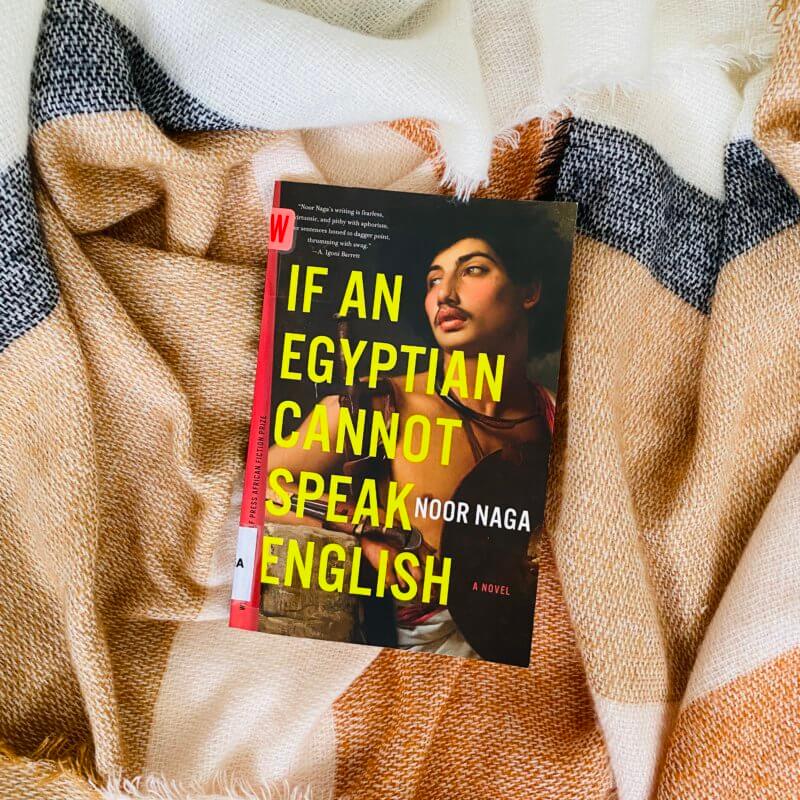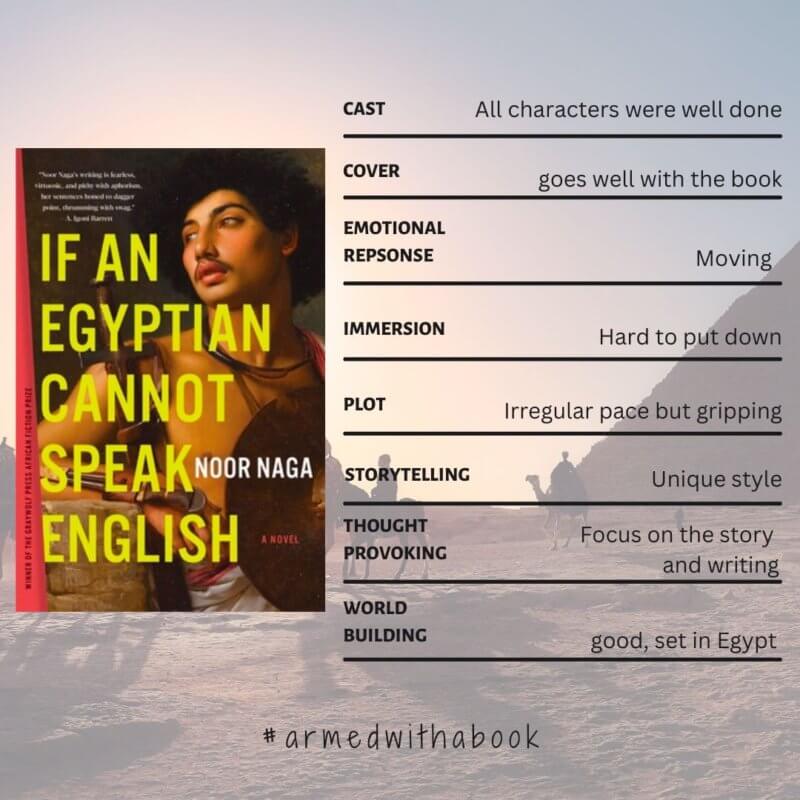My second read from the Scotiaband Giller Prize 2022 Finalists, If an Egyptian Cannot Speak English by Noor Naga is a book I am glad I picked up. A dark romance written in three parts, this one has a lot to offer about living experience in Egypt, the concept of being from a culture as well as the personal tragedies that life throws at us. Take a look at the synopsis and read on for my thoughts.
If an Egyptian Cannot Speak English

By Noor Naga | Goodreads
In the aftermath of the Arab Spring, an Egyptian American woman and a man from the village of Shobrakheit meet at a café in Cairo. He was a photographer of the revolution, but now finds himself unemployed and addicted to cocaine, living in a rooftop shack. She is a nostalgic daughter of immigrants “returning” to a country she’s never been to before, teaching English and living in a light-filled flat with balconies on all sides. They fall in love and he moves in. But soon their desire—for one another, for the selves they want to become through the other—takes a violent turn that neither of them expected.
A dark romance exposing the gaps in American identity politics, especially when exported overseas, If an Egyptian Cannot Speak English is at once ravishing and wry, scathing and tender. Told in alternating perspectives, Noor Naga’s experimental debut examines the ethics of fetishizing the homeland and punishing the beloved . . . and vice versa. In our globalized twenty-first-century world, what are the new faces (and races) of empire? When the revolution fails, how long can someone survive the disappointment? Who suffers and, more crucially, who gets to tell about it?
Content notes include addiction, domestic abuse, drug abuse, sexual content, racism, stalking, rape, and suicide.
If an Egyptian Cannot Speak English – Review
If an Egyptian Cannot Speak English is a unique book. I have never read anything like it before. The novel is divided into three parts, each a distinct style of storytelling. The two main characters are a girl and a guy, both of them nameless. Their experiences matter way more than their name does and I think in some ways, the lack of the name makes it easier to place anyone in their shoes.
The girl is an American. Her parents are from Egypt but this is her first time there. The boy is from a village in Egypt. He used to be a photographer but hasn’t had a working camera in years. I do not know a lot about what the political landscape of Egypt and the book alludes to significant events from 2011 and 2013. Through both the characters, Noor, the author, paints the picture of modern Egyptian life. I read the side of a foreigner who can potentially blend into the crowd if she doesn’t say a word (she doesn’t speak the language) as well as a local who has lived there long enough to know the heartbreak of everyday life. The writing is descriptive and easy to follow.
Part 1
The first part is written in short sections, narrated by the girl and the boy alternatively. Each section has an overarching question. I tried to find the answer of the question in the succeeding text but they didn’t always make sense. I enjoyed the questions for themselves too and I could sit and write a whole post on these questions alone! Here are some that I liked:
- How many questions can you ask before you expose who you are?
- When is a confession of addiction not a foreshadowing?
- If the shoe doesn’t fit, should you change the foot?
- Is it racist to believe that being sexist makes you more Egyptian?
- Is it arrogant to grieve the loss of what you never had?
At times, the narrative felt like an essay about dislocation and challenging predefined falsehoods. Other times, the experiences of falling in love and into an abusive relationship and trying to figure each other out, the getting-to-know-each other part takes centre stage. I wasn’t really interested in the love story. I wanted to know more about Egypt and the girl being new to it gave me a great perspective to learn from. Her observations of the drinking and dating cultures and her social standing contrasted with her upbringing in New York. I loved seeing how different Egypt and the culture was, how two people together experienced it in their own unique ways.
The guy’s perspective was wonderful to get an outside perspective on the girl and how she was perceived by people around her. The guy is also able to shed light on how similar she is to other tourists who visit Cairo, and yet how different. It also shed light on his experiences growing up, the contrast of rural life to city upbringing.
I related to this line that she said. It applies to me when I am in India:
I’m the other kind of other. Someone come from abroad who could just as easily return there.
If an Egyptian Cannot Speak English, pg 41
A dark romance is bound to have dark elements.
He could be misogynist, but he was also valiant and sentimental, poetic, young-hearted, a weirdo in his way.
If an Egyptian Cannot Speak English, pg 63
A two-sided abusive relationship begins and abruptly comes to an end. He would make up things to tell her and she would believe them because how would you know what someone says they believe is truly what they believe.

Part 2
The storytelling style changes with the change in relationship status. The girl misses the guy but she moves on and decides to experience a more familiar relationship with someone who knows the language. This is where it really hit me – though I always knew that the girl did not know Arabic and the guy did not know English, they were together, living, with limited tools to communicate properly.
What is unforgivable in English, in Arabic has no name I know.
If an Egyptian Cannot Speak English, pg 80
I was reminded of the first couple months when Clinton and I were dating. There is so much to learn about the other person and to not be able to do that because of lack of language is heartbreaking. How do you ask the important questions? How do you get to know the other person’s history? There is a lot to the guy and why he was the way he was. He has seen death, captured bloodshed with his camera and lost the appeal of life. He is an addict who felt whole around her but it was not enough.
They fall back into a strange kind of relationship until the end, for the last time.
Part 3
Up until this point, I had been taking extensive notes, loving the writing, observing both my characters. I was on an eye-opening journey of living in Cairo without knowing Arabic while looking like an Arab.
Part 3 is a classroom setting with an instructor and students. This one I was not prepared for and yet it made this book for me. One of the students in Noor and the class is analysing her writing. I learned why she wrote the first two parts and how they have played a therapeutic role in her coming to terms with what happened. I never doubted that these could have been someone’s real life but I hadn’t expected that to be revealed. This book is marketed as fiction and yet it talks about being a memoir in the third part.
Noor reads the real part 3 of the story to her peers and they give her feedback on the ending. I was sitting in on a book discussion about the two parts I had just read and comments on a potential ending. I suddenly felt drawn into the narrative as myself, part of the group. I found things I had missed while also agreeing with them on many others. Most of us did not care about guy at all. While his end was a sad one, we weren’t really emphatic. We did not develop any care for the relationship that was centre stage to the book. And that makes sense because in its many acts, it was an abusive relationship. Thinking about it now, that was so well written!
This part gave me a new understanding of If an Egyptian Cannot Speak English and brought up bigger questions around narrative style, the art of writing and the consequences of certain things not being made clear. I agreed with the other readers that though I had made it this far in the book, there had to be a stronger ending. And yet, this discussion is such a unique way to end that I don’t know what else to ask for.

I am satisfied that I read this book and I will always remember it as something unique. It is short, under 200 pages, and yet there are so many layers to this story and I can totally imagine spending a month discussing this in a literature class. The curve ball is part 3 and while it didn’t change what I thought of the first two parts, it broadened my understanding of the narrative and I felt validated in how I had grasped it. I kept thinking about this book long after finishing it and it feels so good to have read a masterpiece of writing.
It’s not a short and sweet tale. If an Egyptian Cannot Speak English tells a poignant and dark reality. Add this book to your Goodreads shelf.

Be First to Comment